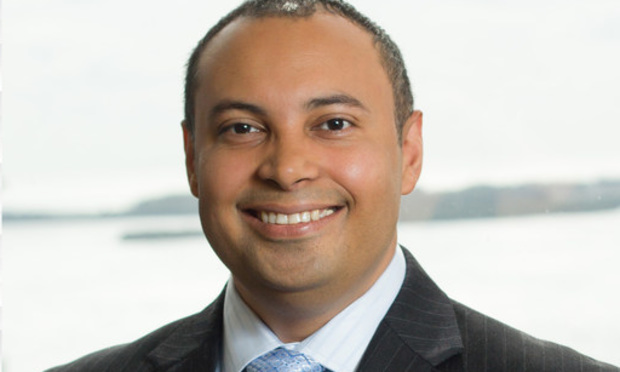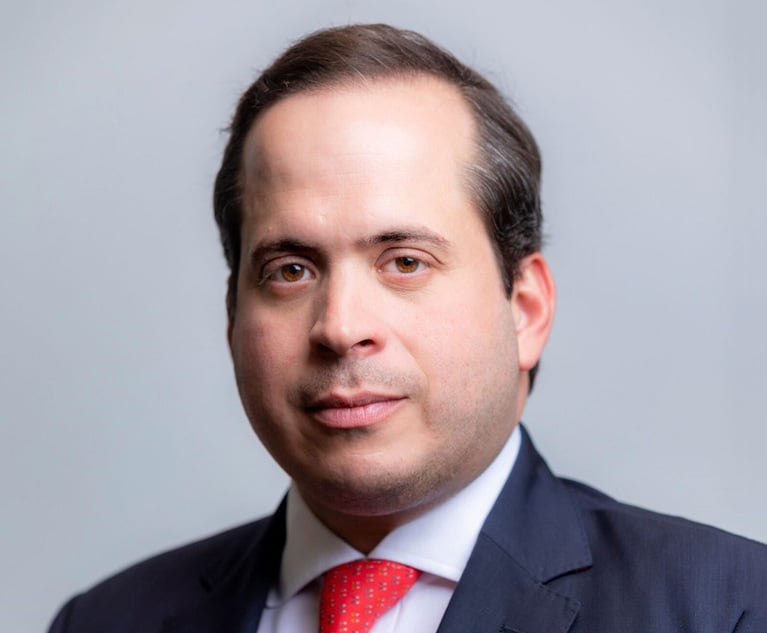Fostering Long-Term Client Loyalty Is Key Driver at Lydecker Diaz
The law firm cemented a client relationship during the recession by training in-house attorneys to take over some of Lydecker's tasks, but the relationship expanded during the recovery.
March 05, 2018 at 12:03 PM
7 minute read

Professional liability partner Onier Llopiz offers an overview of operations at Miami-based, midsize law firm Lydecker Diaz.
How big is your firm, where is it located, and what are its primary areas of practice and focus?
Eighty attorneys; 12 offices throughout Florida, New York, New Jersey and Pennsylvania. Our primary areas of practice are: professional liability, government liability, business litigation, employment and construction litigation.
Please explain your firm's governance structure and compensation model.
Our firm has numerous associates who report to partners. The partners, in turn, report to a firmwide managing partner and senior partners. The firm shares in its profits with its high-level partners. We also have numerous committees and general counsel that are part of the structure.
What do you view as the two biggest opportunities for your firm, and what are the two biggest threats?
Our firm's biggest opportunities lie in growth in new markets where we can partner with existing clients. Another big opportunity for the firm is in growing in core areas due to an increase in litigation — professional liability, government liability and business litigation.
The two largest threats to those opportunities are time and time. It takes time to create the right team in an emerging market, and our firm never expands for the sake of expanding. Our expansion decisions are thoughtful and tempered. We prefer to grow organically; growth is slower but sustained.
After the recession hit, the prevailing theory was that midsize firms would start to see more work come their way from large clients who could no longer justify paying Big Law rates. What has been your experience?
We did gain numerous clients during the recession, which could not justify the Big Law rates and appreciated the firm partnering with them during the low times and assisting them with new opportunities post-recession. Our firm shines when it comes to long-term client engagements by showing our clients loyalty during the bad times; our clients and our firm have grown together along with the economy and have cemented our partnerships. As an example, we had a long-term client which had significant losses during the recession. In order to help our client save costs, we trained their in-house attorneys to handle some of the functions we were handling. While we lost a portfolio on a temporary basis, we in no uncertain terms cemented our partnership with the client and our commitment to a long-term relationship aimed at mutual success. Once the client's position in the market improved, the client was more than happy to not only re-engage all our services but expand our representation.
Are your clients pushing for more alternative fee arrangements and, if so, what types? Is your firm amenable to those requests?
No. About five years ago, alternative fee arrangements were the talk of the town, but in our experience our clients actually preferred budgeting and traditional fee structures.
There is much debate around how law firms can foster the next generation of legal talent. What advantages and disadvantages do midsize firms have in attracting and retaining young lawyers, particularly millennials?
Our firm has studied what motivates this new generation. We have found that millennials abhor “jobs” versus engaging in work activity which is meaningful or has intrinsic high value. For 15 years, our approach has been to motivate our attorneys about their cases and come up with creative strategies to deliver exceptional results for our clients. A huge part of our culture as a firm is a highly collaborative environment that involves attorneys interacting with one another, brainstorming and coming up with solutions that individual attorneys may often miss. Our approach happens to be one that millennials not only understand but appreciate. They are part of something bigger than themselves, they are part of a team, and their specific input can have a real impact.
Does your firm employ any nonlawyer professionals in high-level positions (e.g., COO, business development officer, chief strategy officer, etc.)? If so, why is it advantageous to have a nonlawyer in that role? If not, have you considered hiring any?
Our firm employs a nonlawyer operations manager who helps to manage all of our offices, oversees human resource functions, manages our vendor contracts and oversees employee benefits as well as risk management. We also have a controller who is not a lawyer. The advantage to having nonlawyers in these positions is that we maintain a grounded approach to management. We understand how each decision is going to impact our employees across-the-board instead of just promoting attorney interests.
What if any technology advancements have you made in your firm in recent years? What are the challenges in implementing tech changes?
Our firm is usually on the cutting edge of technology because many of our senior partners are very technologically savvy. Years ago we began a paperless initiative, which has resulted in a 70 percent reduction in the use of paper, ink and printing resources. In place of paper, most of our partners use tablets to supplement their desktops and laptops. We use cloud-based computing for many of our e-discovery tasks, secure remote connections to offer flexibility to some employees, integrated communications systems to allow our computers to interact seamlessly with our phones, conference line systems and imaging systems. We have an information technology department that is not only available to fix problems but engages in daily productivity training and security updates. The biggest challenge in implementing tech changes is that the deployment are not always as fast as you may want as you have to make sure to adequately train employees to become aware of potential vulnerabilities to avoid potential network intrusions.
What would you say is the most innovative thing your firm has done recently, whether it be internal operations, how you work with clients, etc.?
Over the course of the last year, our firm began creating comprehensive remote computer experiences for some of its partners who may spend time in multiple states, second homes, or may have to work from home occasionally to the point where the partner has complete use of their computer, office phone and our network from their secondary location. It allows clients to reach our lawyers just as easily as if the lawyer is behind his or her own office desk, and gives the lawyer access to all necessary information just as easily.
Does your firm have a succession plan in place? If so, what challenges do you face in trying to execute that plan? If you don't currently have a plan, is it an issue your firm is thinking about?
The vast majority of the firm's partners today were associates at the firm many years ago. The firm's leadership consists of partners who have worked together for decades. The firm's next generation of leaders is already here, already engaged and already helping in making decisions that will affect us in the years to come.
This content has been archived. It is available through our partners, LexisNexis® and Bloomberg Law.
To view this content, please continue to their sites.
Not a Lexis Subscriber?
Subscribe Now
Not a Bloomberg Law Subscriber?
Subscribe Now
NOT FOR REPRINT
© 2025 ALM Global, LLC, All Rights Reserved. Request academic re-use from www.copyright.com. All other uses, submit a request to [email protected]. For more information visit Asset & Logo Licensing.
You Might Like
View All
How Uncertainty in College Athletics Compensation Could Drive Lawsuits in 2025

'As I've Grown Older': John Morgan Looks Back at a Life in Law

Race for Clerk and Comptroller in Miami-Dade: Juan Fernandez-Barquin vs. Sen. Annette Taddeo
11 minute read
Meet Jesus M. Suarez: New Chair of the Eleventh Circuit Judicial Nominating Commission
4 minute readTrending Stories
- 1Investor Sues in New York to Block $175M Bitcoin Merger
- 2Landlord Must Pay Prevailing Tenants' $21K Attorney Fees in Commercial Lease Dispute, Appellate Court Rules
- 3Compliance with EU AI Act Lags Behind As First Provisions Take Effect
- 4NJ's Pardons and Commutations A Model for the Federal System
- 5As Political Retribution Intensifies, Look to Navalny's Lawyers
Who Got The Work
J. Brugh Lower of Gibbons has entered an appearance for industrial equipment supplier Devco Corporation in a pending trademark infringement lawsuit. The suit, accusing the defendant of selling knock-off Graco products, was filed Dec. 18 in New Jersey District Court by Rivkin Radler on behalf of Graco Inc. and Graco Minnesota. The case, assigned to U.S. District Judge Zahid N. Quraishi, is 3:24-cv-11294, Graco Inc. et al v. Devco Corporation.
Who Got The Work
Rebecca Maller-Stein and Kent A. Yalowitz of Arnold & Porter Kaye Scholer have entered their appearances for Hanaco Venture Capital and its executives, Lior Prosor and David Frankel, in a pending securities lawsuit. The action, filed on Dec. 24 in New York Southern District Court by Zell, Aron & Co. on behalf of Goldeneye Advisors, accuses the defendants of negligently and fraudulently managing the plaintiff's $1 million investment. The case, assigned to U.S. District Judge Vernon S. Broderick, is 1:24-cv-09918, Goldeneye Advisors, LLC v. Hanaco Venture Capital, Ltd. et al.
Who Got The Work
Attorneys from A&O Shearman has stepped in as defense counsel for Toronto-Dominion Bank and other defendants in a pending securities class action. The suit, filed Dec. 11 in New York Southern District Court by Bleichmar Fonti & Auld, accuses the defendants of concealing the bank's 'pervasive' deficiencies in regards to its compliance with the Bank Secrecy Act and the quality of its anti-money laundering controls. The case, assigned to U.S. District Judge Arun Subramanian, is 1:24-cv-09445, Gonzalez v. The Toronto-Dominion Bank et al.
Who Got The Work
Crown Castle International, a Pennsylvania company providing shared communications infrastructure, has turned to Luke D. Wolf of Gordon Rees Scully Mansukhani to fend off a pending breach-of-contract lawsuit. The court action, filed Nov. 25 in Michigan Eastern District Court by Hooper Hathaway PC on behalf of The Town Residences LLC, accuses Crown Castle of failing to transfer approximately $30,000 in utility payments from T-Mobile in breach of a roof-top lease and assignment agreement. The case, assigned to U.S. District Judge Susan K. Declercq, is 2:24-cv-13131, The Town Residences LLC v. T-Mobile US, Inc. et al.
Who Got The Work
Wilfred P. Coronato and Daniel M. Schwartz of McCarter & English have stepped in as defense counsel to Electrolux Home Products Inc. in a pending product liability lawsuit. The court action, filed Nov. 26 in New York Eastern District Court by Poulos Lopiccolo PC and Nagel Rice LLP on behalf of David Stern, alleges that the defendant's refrigerators’ drawers and shelving repeatedly break and fall apart within months after purchase. The case, assigned to U.S. District Judge Joan M. Azrack, is 2:24-cv-08204, Stern v. Electrolux Home Products, Inc.
Featured Firms
Law Offices of Gary Martin Hays & Associates, P.C.
(470) 294-1674
Law Offices of Mark E. Salomone
(857) 444-6468
Smith & Hassler
(713) 739-1250






